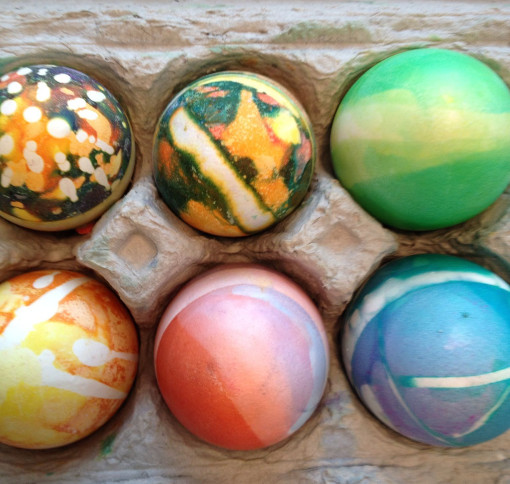Happy Easter

This is what happens when you have small children – you dye your kitchen.
Yes, the festival of Easter, goddess of the Spring, is celebrated this time of year with the traditional symbols of fertility, the egg and the rabbit, by the people who settled around the Baltic Sea – the Teutons, Slavs, Finns, Prussians, Letts, et al. It is a festival of plenty after the hardships of winter, with the promise of new growth.
Of course, later groups took the celebration and turned it to other purposes, but I doubt Easter minds.
I celebrated by buying stuff to rehab an apartment. Everyone has their own way of observing holidays.



































5 comments
While the rabbits and eggs were clearly hijacked from a fertility rite, Easter itself is pretty closely tied to Passover, which isn’t so, uhm, fertility-rite-ish.
A friend of mine has 15 and 18 year old kids still at home. Yeah, he was dyeing eggs again this year because they declared they weren’t too old for Easter :).
In Southern Europe the holidays [Passover/Easter] were called Pascha, but Northern Europe used the name of the Teutonic goddess of Spring Easter/Eostre. It was a festival of rebirth/resurrection which involves fertility and was an excuse for sex until the missionaries showed up and put a stop to it.
Your celebration sounds fulfilling. It’s always nice to know you have most of the items needed to do the job. I, myself, spent the day buying seeds and plants, then planting them.
The Eostre story always goes around this time of year, but there’s a few problems with it. 1) We don’t have any evidence of the existence of this goddess Eostre prior to the 8th century, despite the fact that we have evidence of the existence of other Germanic gods long predating that time, 2) the other Germanic gods had direct analogues in the Greco-Roman pantheons but no female fertility goddess existed in the Greco-Roman pantheons, 3) The holiday Easter is specifically tied to the Jewish holiday Passover which has nothing at all to do with any Germanic goddesses.
So yes, the bunnies and eggs are probably related to Germanic fertility rites of spring and became associated with Easter because Easter generally happens in the spring, but the evidence for the existence of an actual fertility goddess Eostre is… well, at best, inconclusive.
Nice to see you, OWL. It’s better when you are collecting to parts for someone else to use 😉
The problem, Badtux, is that the Romans weren’t looking for a goddess of Spring because they didn’t have one. Bede noticed her in the 9th century because people continued the celebration. The name also gave the name of the direction East/Ost – the direction of the sunrise. The West has no true counterpart for the Russian god Perun, Those who have heard about him try to call him a war god, when he was a god of defense. Perun didn’t think much of people who wandered around causing trouble. If you don’t have an analog in your culture you won’t seek a word for it in another culture.